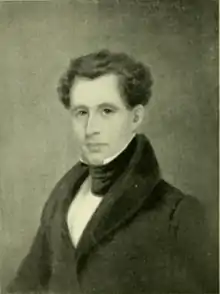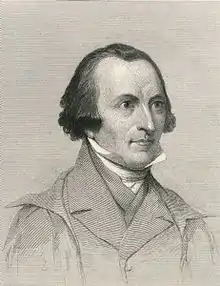James Gates Percival
James Gates Percival (September 15, 1795 – May 2, 1856) was an American poet, surgeon, and geologist, born in Berlin, Connecticut and died in Hazel Green, Wisconsin.[1][2][3]

James Gates Percival | |
|---|---|
 | |
| Born | September 15, 1795 Berlin, Connecticut |
| Died | May 2, 1856 (aged 60) Hazel Green, Wisconsin |
| Citizenship | American |
| Genre | Poetry |
| Signature | |
Biography
He was a precocious child, and a morbid and impractical, though versatile, man, with a facility in writing verse on all manner of subjects and in nearly every known meter. His sentimentalism appealed to a wide circle, but his was one of the tapers which were extinguished by James Russell Lowell. He had also a reputation as a geologist. Percival entered Yale College at the age of 16, and graduated at the age of 20 at the head of his class. After graduating he was admitted to the practice of medicine and relocated to Charleston, South Carolina, where he pursued that profession. A volume of his collected poems was published in New York and London in 1823.[4] In 1824 he was briefly a professor of chemistry at West Point, where he resigned after a few months, and subsequently several years of his labor were devoted to assisting Noah Webster in editing his great American Dictionary of the English Language of 1828. In 1835 Percival was commissioned by the governor of Connecticut to prepare a geological survey of the state, which was completed and published in 1842. In 1854 he was appointed to make a similar geological survey for the state of Wisconsin, with the title State Geologist. The first annual report was issued in 1855, and while preparing the second annual report for the press he succumbed to illness and died in May 1856. Most of his life was spent at his home in New Haven, Connecticut. After his death he was the subject of an admiring biography by Julius H. Ward.
Select works
- Prometheus, part II: with other poems (1821)[5]
- Poems (1821)
- Clio. No. 1-2 (1822)
- A Geographical View of the World Embracing the Manners, Customs, and Pursuits of Every Nation, ed. (1825)
- Poem delivered before the Connecticut Alpha of the Phi Beta Kappa Society (1826)
- Clio. No. 3 (1827)
- Report on the Geology of the State of Connecticut (1842)
- The Dream of a Day (1843).[6]
- Annual Report of the Geological Survey of the State of Wisconsin (1855-1856)
- A short poem by him, "The Language of Flowers", was set to music by the English composer Edward Elgar at the age of fourteen.[7]
References
- Kelly, Howard A.; Burrage, Walter L. (eds.). . . Baltimore: The Norman, Remington Company.
- History of Grant County, Wisconsin. Chicago: Western Historical Company, 1881, pp. 576-581.
- http://www.wisconsinhistory.org/wlhba/articleView.asp?pg=4&id=2487&pn=1&key=&cy=
- "U.S. Poet of Obscurity: James Gates Percival". The Salt Lake Tribune. September 20, 1959. p. W15. Retrieved April 28, 2017 – via Newspapers.com.

- http://www.wisconsinhistory.org/dictionary/index.asp?action=view&term_id=1670&keyword=percival
- https://openlibrary.org/a/OL410724A/James-Gates-Percival
- Diana McVeagh, Elgar the Music Maker, p. 3 "Elgar composed the song 'The Language of Lowers' (1872) when he was not quite fifteen. The verses are by the American poet and botanist, James Gates Percival."}
Sources
- McVeagh, Diana M. (2007). Elgar the Music Maker. Woodbridge, Suffolk: Boydell Press. ISBN 978-1-84383-295-9.
- The Poetical Works of James Gates Percival. With a Biographical Sketch. Boston: Ticknor & Fields. 1859.
- Life and Letters of James Gates Percival, by J.H. Ward (Boston: Ticknor & Fields, 1866).
 This article incorporates text from a publication now in the public domain: Cousin, John William (1910). "Percival, James Gates". A Short Biographical Dictionary of English Literature. London: J. M. Dent & Sons – via Wikisource.
This article incorporates text from a publication now in the public domain: Cousin, John William (1910). "Percival, James Gates". A Short Biographical Dictionary of English Literature. London: J. M. Dent & Sons – via Wikisource.- Chisholm, Hugh, ed. (1911). . Encyclopædia Britannica. 21 (11th ed.). Cambridge University Press.
External links
| Wikiquote has quotations related to: James Gates Percival |
- James Gates Percival Collection. Yale Collection of American Literature, Beinecke Rare Book and Manuscript Library.
